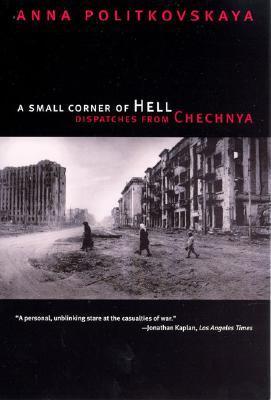What do you think?
Rate this book


232 pages, Paperback
First published January 1, 2002
If you're not a victim of terrorism, there are no rehabilitation centers, psychotherapists, or psychiatrists for you.Between the year this work was first published and the year my own edition was, Anna Politkovskaya, fearless journalist, writer, and human rights activist, was shot dead in the elevator of her apartment block in Moscow. It would be hard to say whether every US person who calls themselves a Caucasian because that's what the White Powers That Be tell them to do would mourn such a tragedy or not. On the one hand, Russia is Russia, and one cannot expect such a country to treat their women any better than what Politkovskaya got. On the other hand, this work of hers draws a pretty strong correlation between the Islamophobia cultivated by Euro/Neo-Euro groups and the fulfillment of these so called 'Western' countries gluttony for oil, and it's not hard to see the US president as a mirror of Putin, Iraq as one of Chechnya, Politkovskaya's murderers as one of Lynndie England. The average person in the US is going to get quite pissy in reaction to such a statement, but nearly two and a half centuries after their country was founded and four centuries after the groundwork was laid for the founding through slavery and genocide, I am utterly done with the type that says Antifa are terrorists and that a Biden/Hitler ticket is better than Trump. So what if they don't biologically qualify as narcissists/sociopaths/psychopaths/whatever the fashionable dehumanizing word of the day is for neurotypicals looking for some quick and easy social justice points. People overcome their chemically-driven empathy every day: that makes their grasp on ethics suspect, not crazy.
What happens to businesses that lose billions? Very simple: they stop operating.It'd be easy to let yourself be smacked in the face by this barely over 200 page pamphlet over and over and over and not derive anything from it besides West good, East bad, Russia a personal foe, and Chechnya complicated. Even Politkovskaya relies too much on European ethical guilds and Occidental systems of morality near the very end when it comes time for her to paint a picture of a future rising above the ashes of past and present. However, if one has read From the Ruins of Empire or something similar, and is also keeping up with the news of the oligarchical destabilization of a constitutionally sanctioned public communication utility (I'd think that qualify as terorrism, no?), this is just another piece of the puzzle. It doesn't hurt at all that this edition includes a wonderful introduction by Georgi Derluguian, who in the span of 25 pages not only cleared away the cobwebs of what bits of Chechnya awareness I've picked up from Wiki articles and the odd movie, but did so with full due paid to the standards of information literacy. Construction of authority, information creation as process, information as something of value, research as inquiry, scholarship as conversation, searching as strategic exploration: it's something I can say that I teach for a living, and it's what I watch out for in my reading whenever I have the brain energy to spare.
What happens to the Ministry of Defense if one of its subdivisions incurs billions in losses? The answer is surprising: absolutely nothing. Not only that, but its superiors cite its work as exemplary.
Yet both pillars of Putin's stability seems shaky: the high energy prices that benefited Russian cannot last forever, and the "antiterrorist campaign" in Chechnya is still far from over after three years.Thirteen years after my edition was published, Putin's still in power, liberals are promising to keep Biden and Kamala accountable, and everyone who was protesting Obama's war crimes back when he was still in office have no illusions about anyone who demonizes any social justice action that isn't confined to the ballot box. Is it exhausting? For sure. Does it drive people to turn off their brains and hang on desperately to any bandwagon that doesn't require any sort of actual building of solidarity or combatant of institutionalized dehumanization? All the time. After reading this work, do I think the United States is in any position to judge Russia? To appeal to the Christians in the crowd for a moment, I believe there was something in the Bible about a beam in one's eye and all that, but it wouldn't hurt to see the similarities between the midnight executions of Chechen woman heads of villages and the case of Breonna Taylor. I encourage my fellow citizens to vote early (and perhaps forgo their mailbox for their local ballot box), socially distance, wear masks, and wash their hands, but my god, y'all realize that calling real human beings Russian psyops for refusing to ignore the implications of a politician's track record just cause they're not orange is depriving people who disagree with your views of state officials of their humanity, which is exactly what fascists do? I certainly learned a lot from this book, but on the level of compare and contrast with my own circumstances, not with any view of swooping and rescuing the poor liddle Chechnyans from the big mean Russians with my super US powers. All in all, do I think most others who read this text are going to put in the same amount of effort? In a word: nah.
-Georgi Derluguian, Introduction
Politically, what neoliberal market economists presented as their major virtue proved to be their biggest fault: the hard-nosed insistence that the economy must be left to the globally connected technical experts like themselves and certainly not to the soft-hearted humanistic intellectuals and common populace, whose demands of stable jobs and living wages endangered monetary stability.There's nothing like a plague to test a society's true stability. It just depends on how many human sacrifices are required to effect change, or, perhaps, what type.
-Georgi Derluguian, Introduction